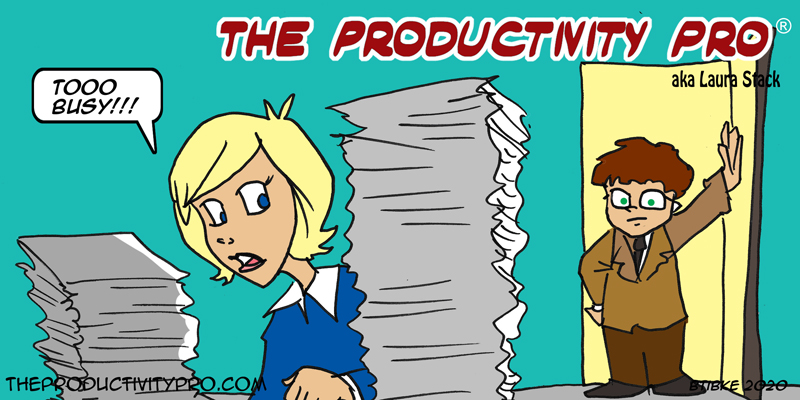
“It’s only by saying “no” that you can concentrate on the things that are really important.”—Steve Jobs, founder of Apple
Longtime readers of this blog know that one of my least-favorite phrases is, “That’s not my job.” I believe most workers should willingly try to handle all aspects of their positions. Taking on new tasks is the only way of really understanding and internalizing them, no matter how well-documented the task is. Some nuances only become evident when you’re in the thick of things.
However, sometimes “That’s not my job” is a valid, if ill-advised, excuse—especially if you already have too much to do, or find yourself on the verge of overwork, where one last procedural straw might break the back of your ability. I recommend you phrase it in a way that doesn’t destroy your relationships, however. Try these options instead:
- Give me extra time. Rather than turn someone down flat, tell them you’d be happy to work on their project when you have time—but not right away. This works when you would like to participate, but really are too busy. You don’t have to give them a specific date when you’re able to work on it. Often, the person will go looking for someone else and won’t ask for your help later, so keep this in mind.
- Can we revisit this in…? A more definite version of the above, this one sets a time when they can check with you again: for example, next week, next month, or next quarter. It’s appropriate for tasks you’d like to work on but are simply too busy for, as well as those where you expect the person won’t want to wait for you. Careful here, as some coworkers will put the new date on their schedule and ask you again later. I recommend you save this for tasks you’re interested in, or at least willing to take on eventually.
- Let me think about it. Everyone knows what this means, because we’ve heard it from our parents. “Let me think about it” doesn’t always translate to “No,” but most of us recognize it as an indirect way to defer a “No” answer. You can, in fact, use this phrase when you’re wavering about whether you have the time and willingness to take on another task, and some people will take it as face value. But most, especially those in a hurry to find someone for the task, will move on to someone else.
- I’d love to, and… This opening phrase serves as a kind letdown to let someone know it isn’t a high priority, whether it’s because you’re just too busy or you really don’t want to do it. It may be true, or it may be a white lie; but then, this applies to most forms of social lubrication.
- I’m devoting all my attention to XYZ this week/month/quarter. This tells your coworker the new task just doesn’t fit your plans. Enough said, if politely said.
- Which project do you want me to put on the back burner? This phrase applies to the type of manager who keeps piling on “urgent” projects he or she all wants due at the same time. You’ll have no choice but to rearrange priorities, whether they want you to or not. Before you do so, tell them, “I’m happy to work on this now and need to understand what tasks you want me to drop or set aside to get this done on your timeframe. Some options are A, B, C.” Do this only in the sanctity of their office, never in public, because otherwise they may construe it as undermining their authority. If they still want everything done simultaneously, focus on one task at a time and turn in the pieces as you go to show progress.
I Don’t Want to Miss a Thing
Let’s face it: you usually have plenty of your own work to do. It’s nice when someone invites you to collaborate on projects. If you have time or feel a need to participate in extra work, fine. But if not, tell your co-workers “no” in a way that spares their feelings. It’s courteous, and so much better than overburdening yourself with unnecessary work until you burn out or miss all your deadlines.
© 2020 Laura Stack. Laura Stack, MBA, CSP, CPAE is an award-winning keynote speaker, bestselling author, and noted authority on employee and team productivity. She is the president of The Productivity Pro, Inc., a company dedicated to helping leaders increase workplace performance in high-stress environments. Stack has authored eight books, including FASTER TOGETHER: Accelerating Your Team’s Productivity (Berrett-Koehler 2018). She is a past president of the National Speakers Association, and a member of its exclusive Speaker Hall of Fame (with fewer than 175 members worldwide). Stack’s clients include Cisco Systems, Wal-Mart, and Bank of America, and she has been featured on the CBS Early Show and CNN, and in the New York Times. To have Laura Stack speak at an upcoming meeting or event, call 303-471-7401 or contact us online.



How do you express your frustration when you continue to receive more work because your supervisor feels he/she can’t count on your co-worker to complete it or knows she does not want to do it?